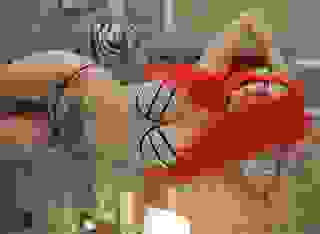Note: You can change font size, font face, and turn on dark mode by clicking the "A" icon tab in the Story Info Box.
You can temporarily switch back to a Classic Literotica® experience during our ongoing public Beta testing. Please consider leaving feedback on issues you experience or suggest improvements.
Click here"Mrs. Anderson, I know this isn't a good time to ask, but how is your relationship with your husband? Any problems?"
She frowned again.
"I watch the cop shows on TV. What you're really asking is did I have anything to do with this. Well, the answer is Carl and I were getting along fine. He worked hard all week, sometimes even on Saturday, but then he'd come home to this place he built and we'd relax together. It was important to him that I was happy. That's why he built this place. I love being outdoors and he bought this land and built this house so we could do that together.
"Before you ask, no, we weren't having any problems in the bedroom either. I loved Carl and he loved me and part of relaxing was...well, we weren't having any problems that way either."
I wrote that down on my note pad. I'd verify that by talking with the other members of Mr. Anderson's re-enactment group and any other friends I could identify. Then I asked her if she was going to be all right financially. That caused her to smile.
"So, what you're really asking is if Carl had any life insurance. The answer is yes. He still owed money on what he borrowed by buy his dad out and he borrowed money for materials and labor for every job, so he took out a life insurance policy for five million dollars with double indemnity if his death was the result of an accident. I'll be able to pay off all his loans and still keep the construction company and this place. I suppose that makes me a prime suspect doesn't it?"
Her last words were more of a plea.
"Detective Mason, you can check me out all you want, but all you're going to find is I'm a woman who loved her husband and is going to miss him terribly. Just promise me you'll find out who did this."
I made that promise, gave Mrs. Anderson my card, and asked her to call me when she had the names and addresses I'd requested or if she thought of anything else that seemed relevant.
}|{
When I got back to my desk and sat down, there was a note from the Captain that said the Governor of Tennessee wanted us to solve this as quickly as possible. The Tennessee Entertainment Commission was nervous that an accident like this might hurt Tennessee's chances for future film and television work. The note also said the Governor had given instructions to the TBI to assist me in any way I needed.
When I looked at my lists, I had five hundred plus names, over five hundred people I'd have to find and talk to. That was going to take months, and I didn't have months. What I could have used right then was about a hundred TBI agents to go talk to people, but I knew that wasn't going to happen. I might get one or two, but it would still take a month for three of us to interview everybody who'd been on the set. I had to weed out a lot of those names.
One way to do that was to find out more about Mr. Anderson. While I believed it was an accidental death, there was a possibility it was murder. People get themselves killed for any number of reasons, but it's usually because of a beef between them and somebody else. That somebody else is usually a person or persons the victim knows on a personal basis. The names his wife had given me were a good place to start once I had a better understanding of Mr. Anderson and his business and personal life.
NCIC had nothing on Mr. Anderson except the fingerprints he had taken when he applied for a concealed carry permit three years earlier, so that was a bust except that he might have gotten a carry permit because someone had threatened him. The contractor his wife had spoken of apparently hadn't made a threat, but he'd obviously been pretty mad. Mad people sometimes do dumb things.
The DMV had his vital statistics and address, but I already knew those. The only other thing the DMV had was a speeding ticket from five years before. I also checked the court records of Tennessee and didn't find anything. Apparently Mr. Anderson was like about ninety-nine percent of the population of Tennessee other than his participation in Civil War reenactments and having a concealed carry permit.
He obeyed the law and other than the one speeding ticket, had never had any other contact with law enforcement. He'd never served on a jury or been called as a witness to a crime either. Both are sometimes the reason for a murder. You help convict some scumbag and his gang decides to teach the community a lesson by killing you.
That information, or rather, the lack of information led me to abandon my search for a motive for the present. That didn't mean no crime had been committed. Mr. Edwards was dead and somebody was responsible. It might have been a pure accident or it might have been negligent homicide because a person acted in a way that he or she should have known could result in a death, but it was still a murder.
Looking for someone who had an opportunity wouldn't reduce my list. Anyone who was on the set could have had an opportunity. Instead, I started to temporarily eliminate anyone who didn't have ready means to kill Mr. Anderson. That initially eliminated all of the regular cast and crew because it was very unlikely they'd have had a weapon. Only the re-enactors did so I'd interview them first.
The president of Cumberland Civil War Reenactors was listed as Craig Nelson. They had played the part of the Union troops in the movie. I called him and asked if he had time to speak with me about Mr. Anderson. Mr. Nelson said if it helped figure out what happened, he'd be more than willing to come to the station. When I asked what time, he said he'd be there after he got off work at four.
I began the interview with my standard questions -- did he know of anyone who might want to hurt Mr. Anderson, did he know of any problems between Mr. Anderson and his wife, and did Mr. Anderson seem upset about anything on the day he was killed.
Mr. Nelson had nothing but praise for Mr. Anderson. He said that Mr. Anderson didn't have a problem with anybody in the group, though he didn't know anything about his business. He said Mr. Anderson's wife usually came along when they were doing a re-enactment and she dressed in costume, so he didn't think they were having any problems. Mr. Nelson grinned then and said on the day Mr. Anderson was killed, he'd been joking with the other members of the group that he'd be discovered and become a famous actor overnight.
Mr. Nelson shook his head and frowned then.
"I guess Carl will end up being famous, just not in the way he was joking about."
I then asked Mr. Nelson if he had any ideas about how this could have happened.
"Mr. Nelson, since the set armorer checked all your weapons and cartridge boxes and furnished all the ammunition, how could this have happened?"
Mr. Nelson stared at me for a few seconds before he raised his voice just a little.
"Is that what they told you? Well, they lied. Nobody checked anything except us. We follow the safety rules for our organization. The rules say the commander of the group has to inspect every weapon, but we took it a step further. Both re-enactment groups had their rifles inspected by the other re-enactment group. If there'd been only one group on the field, the men would have paired up and checked each other. The other commander and I made a final check before any weapons were loaded.
"Our ramrods are all marked with a line that shows when the ramrod seats in an empty barrel. If you drop the ramrod into the barrel and it's empty, the line is at the muzzle. You'll also hear a little ringing sound when the button on the ramrod hits the breach end of the barrel. If the ramrod is any higher than that line or if there's no ping sound, that means that rifle has something in it, and that means that rifle doesn't go anywhere until whatever is down there in the breach is removed.
"It's the same with any revolvers. Only officers and senior non-commissioned officers can carry them, and they're inspected before any leave the mustering area. You give me yours and I give you mine and we each look in each chamber to make sure we can see the bottom and we run a rod down the barrel to make sure it's clear. After that, the revolver goes into a holster with no caps and the holster is secured to retain the revolver.
"It's permitted for the officer or NCO to draw his revolver during a reenactment, but they're never loaded. It's too hard to keep the muzzle in a safe direction, so they're there for period accuracy only.
"Any reenactor who won't allow his weapon to be inspected is not allowed on the field, but it goes farther than that. No reenactor is allowed to participate unless he has demonstrated the proper drill of the era and safe operation the weapon they carry and are certified by their company commander. Most of our members have served in the military so they don't need to be tested for safe operations but we still do.
"Safety is such a concern that we don't allow any re-enactor to pull his ramrod and ram a charge home when loading. We just pour the powder charge down the barrel, tamp the butt on the ground to settle it, and then cap the rifle. That does two things toward safety. First, it would be possible to leave a ramrod in the barrel, and when fired, that ramrod would become a deadly projectile. The second thing it does is it forces the re-enactor to keep the barrel elevated so the gunpowder doesn't run back out of the barrel. That means every shot is going to be over the heads of the opposing force.
"That elevation is also part of our safety rules. If you're within twenty-five yards of the opposing force, you can't fire your weapon. If you're over that distance, all rifles have to be elevated so you're not shooting directly at anybody. That's so anything in the barrel will go over the heads of the opposing force. We always place markers on the ground so the re-enactors know when they're at those ranges.
"We tried to do that on the set, but the director said the markers would mess up his filming. All our guys have done this a lot of times before and they can estimate the range, so that's what we did. If anything, they wouldn't fire if the opposing force was less than fifty or even seventy-five yards just to be safe.
"The only thing the armorer did was give us each twenty paper tubes of his special gunpowder and tell us to make sure nobody was in front of the muzzle when we fired because his powder was designed to produce more flames and smoke than normal black powder."
Well, that was an interesting revelation. It looked like the armorer had lied to me for some reason.
"Since the armorer gave you the gunpowder, could there have been a bullet in one of the tubes?"
Mr. Nelson shook his head.
"If there was, none of our men would have loaded it. It would have been a lot heavier than just gunpowder so he'd have known something was wrong with it."
I thanked Mr. Nelson for taking the time to talk with me and then walked him to the door. Just before he left, he turned to me.
"Detective, if there's anything I or any of my men can do to solve this, all you have to do is ask. I know the other reenactor unit feels the same way. It's been almost twenty-five years since a reenactor was injured by a firearm during a reenactment and we're proud of that. We don't want some politician using this as an excuse to make us stop using our weapons to teach people about that time in history. Find out who did this and make him pay the price for it."
Mr. Nelson had seemed sincere in everything he said, and he had no reason to lie to me because Mr. Anderson was part of his group and apparently a good friend as well. I couldn't say that about the set armorer. If I could corroborate what Mr. Nelson had told me about the armorer's inspection, I had some more questions for the armorer.
}|{
My next call was to Mr. Greg Thomas, the man on the list as the president of a re-enactment group from Chattanooga. He gladly volunteered to talk with me.
"Detective Mason, if it helps get to the bottom of this, I'll give you all the information I have about our organization and our men. I'm working this afternoon, so I can't really drive to Nashville. Feel free to come to my cabinet shop in Chattanooga today, or I can drive up tomorrow."
It was a little after two by then and the drive to Chattanooga would take at least two hours. That meant I wouldn't get to talk to Mr. Thomas until about four and if I spent an hour with him like I intended, I wouldn't get back to Nashville until after seven and I had other things I could do that afternoon. I asked Mr. Thomas if he could drive up the next day and he said he'd be there about nine.
}|{
After I finished the call, I walked down to the morgue to see if Harry had recovered the bullet. He looked up from Mr. Anderson's body when I walked in and waved me over.
"Mack, I got the bullet and Jack has it, but I found something I've never seen before. Let me get my stick."
Harry took a thin fiberglass rod from his desk, walked over the table and started sticking it into the bullet hole in Mr. Anderson's chest. When it stopped, he looked up.
"Bullet went in, went through his heart, then hit one of his ribs and stopped. That's the first thing that's strange. It doesn't look like the bullet was traveling very fast. If it had been a modern rifle or pistol, it should have either mushroomed out like hell and stopped or smashed that rib on its way out, but it didn't. The bullet looked almost new except for a few scrapes where it hit a rib going in. I don't know why this one was different.
"All it did was make two holes in his heart so he was still alive when the EMT's got to him. They started an IV to try to make up for the blood loss, but he bled out on the way to the hospital.
"The other thing is the angle of the bullet path. See what I mean?"
I did, and I'd never seen a bullet path like that before. By the angle of the rod sticking out of Mr. Anderson's chest, it looked like the bullet was traveling down when it hit, not almost straight on like most bullet wounds would be. I told Harry I didn't see how that could happen and asked if he had any ideas. He stroked his chin.
"Just one, really. If the shooter was higher than the victim, the bullet would have been traveling on a downward angle. There were men on horses there, right? What if he was shot by a man on a horse? The angle is about fifteen
degrees from horizontal as well as I can measure, but I could be off by a couple degrees. That's still about the right angle for a person three or four feet higher than your victim being the shooter."
I asked Harry if he knew the caliber of the bullet and he said he measured it at about eleven millimeters.
"If it had been a modern weapon, I'd say it was either a.44 special or magnum or a.45, but it doesn't look like the bullets I've seen for either of those. Looked to me like it was just lead with no jacket. Jack can probably tell you for sure."
Jack had a lot more information for me.
"Well, I can tell you for sure it didn't come from any rifle the re-enactors were carrying. I looked up their rules. The only rifles allowed are Springfields and Enfields. The Springfields could be either 1861 rifles which are fifty-eight caliber or 1842 Springfields which are sixty-nine caliber and smooth-bore. They were originally designed to fire balls, but when the minié ball was invented, they used those. Enfield rifles were all about fifty-eight caliber but fired a fifty-five caliber minié ball. The bullet from your victim is a forty-four caliber and probably came from a period revolver.
"It's a hand cast bullet from a Lee mold, not a bullet you can buy in a box at your local gun shop, and it weighs about two hundred grains. That's a little heavy for most Civil War era revolvers. They were all designed to fire round balls. You could probably still load a round nosed bullet like this in one of the originals or in a reproduction because it's not much longer than a ball.
"I'm still researching which it might have been fired from, but doing so in any of them would mean you'd have to reduce the powder charge to make room for the bullet nose to seat flush with the cylinder face. That might account for the slow speed that Harry thinks caused the bullet to not do much damage."
"So, you think it was fired from a revolver?"
Jerry nodded.
"If that's the only type of small caliber firearm on the set at the time of the murder, it probably was. The only thing that makes me question that is the rifling. All rifling in the originals and in the reproductions is cut with a sharp tool. The rifling impressions on the bullet look rounded, like the rifling tool was pretty worn on the corners or the gun had been fired so many times the rifling was pretty worn. Like I said, I'm still researching that. Information about how the rifling was done on the originals is pretty sketchy, and the information on the reproductions isn't much better."
}|{
When I got back to my desk, there was a FedEx envelope in my chair. When I opened it, there were ten of what looked like DVD's in cases inside, except they were clear, not colored like most DVD's. There was also a note from the director that said they should play on most newer computer DVD drives. Each disk case was marked with the camera number. I picked out "Camera One" and put the disk into the disk player on my laptop.
It did play, but my screen was so small I couldn't make out much detail. I put the disk back into the case and took them all down to the computer forensics lab. When I asked Don, the senior tech, if he had someone he could free up to help me, he said if I could wait a few minutes, he would.
"Rita is just finishing up on some surveillance video for the guys in Robbery. She should be done in half an hour or so. I just hired Rita and she's a little different, so don't judge her until you get to know her. She's as good as they come with computers and video."
I asked Don what he meant by that and he just grinned.
"You'll see."
Half an hour later, this young girl with long, blonde hair that hung down in thick waves over her shoulders walked up to me, cocked one hip and said, "Don said you needed some help with some video?"
It took me a few seconds to answer because she was beautiful, not movie star makeup and perfect hair gorgeous, just all very sensuous and desirable woman beautiful. The jeans she was wearing fit snug enough to show me she had long, slender legs. Her top was a T-shirt that fit just as snuggly over a pair of breasts that looked to be pretty large even though it seemed like she was trying to minimize them with one of those bras that smooth everything out. Her smiling lips were just pouty enough to make them sensuous, her nose small, and her eyes...well, her eyes trapped mine for a few more seconds. They were a deep blue with a sparkle that wouldn't quit.
"Yeah, I have a bunch of video and I need to find one particular person. Can you do that?"
She grinned.
"Does a fish swim in water? Let's see whatcha got."
I explained what the disks were as I handed her the stack of disks and she grinned an even bigger grin.
"Wow, M-Disks. I never get to play with these. Let's go to my desk."
Rita's desk was a long lab table with what looked like six wide-screen TV's and six desktop computers. She put the disk for Camera 1 into the disk drive on one computer and when it loaded, she clicked "Play". When the video started playing, an almost overhead view of the scene, she turned to me.
"Do you have a time that you're interested in and what are you looking for?"
I said sometime between seven and seven thirty and I wanted to know which direction the bullet came from. Rita tapped a key on the keyboard and a window popped up.
"Most professional digital video cameras record time information in a metadata file. You probably can't see it on your laptop, but I can. Let's see if they set the date and time before they started filming."








